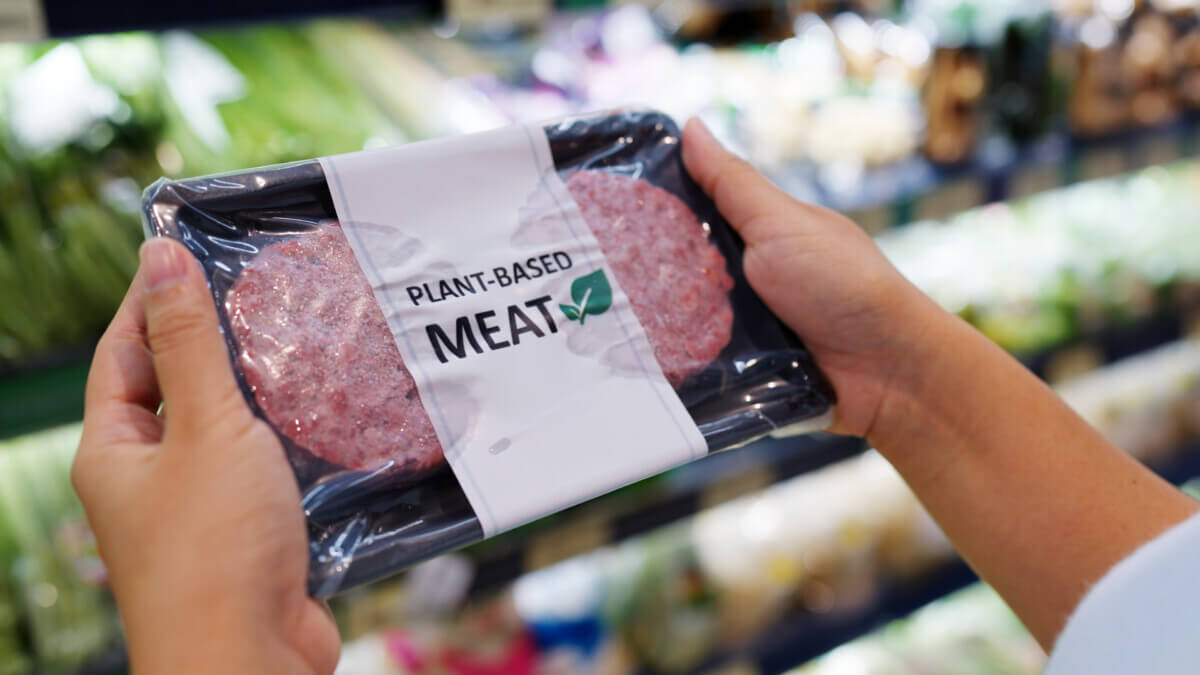
Melbourne, Victoria, Australia, 30 July 2022: Go Vegan for our earth written on a sign at a rally. (Photo by Christie Cooper on Shutterstock)
From anger to envy to fear, just seeing people shop for meat alternatives sparks a slew of negative emotions in others
In a nutshell
- Consumers of plant-based meat alternatives are viewed as competent and environmentally conscious, but also face social stigma including contempt, envy, and potential exclusion.
- “Flexible eaters” who consume both meat and plant-based products face less social judgment than those who exclusively choose plant-based options.
- Marketing strategies promoting flexible consumption patterns rather than complete meat elimination may help overcome social barriers to sustainable eating.
VAASA, Finland — Most people don’t admit it publicly, but they’re secretly judging that coworker who brought a plant-based burger to the company picnic. A new study reveals that consumers of meat alternatives face complex social stigma across Europe, even as supermarket shelves fill with more plant-based options than ever before.
Researchers found that people who choose plant-based proteins over traditional meat are seen as both admirable and contemptible—respected for their environmental and health consciousness but also frequently met with negative emotions including fear, anger, and social exclusion.
“Despite the urgent need to reduce meat consumption for environmental reasons, meat alternatives account for only 0.7% of the total EU meat market,” explains the study published in the journal Food Quality and Preference. This low adoption might be explained by something deeper than taste preferences—the silent social consequences of choosing plant-based options.
A team led by researchers from Finland studied how regular consumers view people who buy meat alternatives. Rather than just asking about personal preferences regarding plant-based foods, they examined how shoppers perceive others based solely on what’s in their grocery carts.
The researchers conducted an online experiment with 3,600 participants across Finland, Germany, Sweden, and the United Kingdom. Each participant evaluated a fictional shopper based on one of three shopping lists: one containing traditional meat products (meatballs and sausage), another with flexible choices (chicken balls and vegetarian sausage), and a third featuring only plant-based alternatives (plant-protein balls and vegetarian sausage). All lists included the same staple foods—pasta, bread, apple juice, carrots, and bananas.

The findings show just how much social judgment is happening subconsciously when it comes to food choices. People who bought meat alternatives were viewed as more competent than meat shoppers but scored lower on “warmth” evaluations. In more concrete terms, plant-based shoppers were seen as environmentally friendly, morally conscientious, and health-oriented—seemingly positive traits. Yet these same shoppers also triggered more negative emotional responses and harmful social intentions from observers.
“The meat alternative shopper received the highest scores in terms of every emotion, while the meat shopper received the lowest,” the researchers report. These emotional responses included contempt, envy, anger, and fear.
Perhaps most concerning, the fictional shoppers who favored plant-based alternatives also faced the highest risk of both passive and active harmful treatment from observers. In real-world terms, this means potential social exclusion, hostile interactions, or even aggression.
Interestingly, the study found that “flexible shoppers“—those who purchased both animal and plant-based proteins—experienced more favorable treatment than exclusive plant-based eaters. They were evaluated similarly to traditional meat eaters in terms of warmth and faced less risk of negative social consequences.
The researchers also examined whether an observer’s own motivations affected their judgments of others. Two key personality traits—the need for status and the need for group affiliation—proved particularly influential.
People with a strong desire for status demonstrated more negative emotional reactions toward plant-based shoppers. These high-status individuals reported feeling stronger envy and anger when evaluating someone who purchased only meat alternatives.
“Our results suggest that those consumers who seem to favor meat alternatives evoke stronger feelings of anger and envy in observers with high need for status,” the researchers noted. They theorize this may be because meat alternatives represent a symbolic threat to traditional values, particularly for those highly attuned to social status norms.
On the flipside, people with a strong need for group affiliation—those who highly value belonging—showed more positive attitudes toward flexible shoppers who purchased both animal and plant-based products. These affiliation-motivated observers reported less contempt, anger, and harmful intentions toward flexible shoppers compared to those with lower affiliation needs.
This suggests that for people who prioritize social connections, the flexibility to eat both meat and plant-based options appears more socially acceptable than completely abandoning meat.
These findings offer valuable insights for companies trying to encourage broader adoption of sustainable foods. Rather than marketing meat alternatives as radical replacements that require consumers to abandon traditional diets entirely, the research suggests emphasizing flexible consumption might face less social resistance.
“The shopper consuming both meat and meat alternatives was evaluated in a more positive way compared with the meat alternative shopper,” the researchers explain. “This means the most promising avenue for transitioning from meat-intensive diets to more plant-based diets is through promoting a diet that does not entirely eliminate meat but replaces it with plant-based meat alternatives on a weekly basis.”
The study also suggests that manufacturers might consider presenting meat alternatives in ways that emphasize competence and achievement rather than focusing solely on environmental benefits. Since plant-based eaters evoke both envy and admiration related to competence, marketing could leverage these perceptions by highlighting the superiority or excellence associated with choosing sustainable options.
Another approach could involve showing vegetarian consumers in warmer, more relatable terms—portraying them enjoying indulgent yet plant-based meals rather than reinforcing stereotypes of coldness or extremism.
The social stigma surrounding plant-based eating presents a significant barrier to wider adoption that goes beyond product taste or texture. As the climate crisis demands reduced meat consumption, overcoming these social obstacles becomes increasingly urgent. The research suggests that rather than pushing for immediate abandonment of all animal products, promoting flexible consumption patterns may provide a more socially acceptable path toward sustainability.
Paper Summary
Methodology
The research team designed an online experiment that asked 3,600 participants from Finland, the United Kingdom, Germany, and Sweden to evaluate fictional shoppers based solely on their grocery lists. Each participant was randomly assigned to review one of three shopping lists: a “meat shopper” list (containing meatballs and sausage), a “flexible shopper” list (chicken balls and vegetarian sausage), or a “meat alternative shopper” list (plant-protein balls and vegetarian sausage). All lists included identical staple items like pasta, bread, and fruits to disguise the focus on protein choices. After reviewing the list, participants answered questions about how they believed “the average person” would view the shopper, rather than sharing their personal opinions—a technique designed to reduce social desirability bias and uncover shared cultural perceptions.
Results
The study revealed that meat alternative shoppers were viewed as highly competent but low in warmth, triggering what researchers call “envious prejudice.” While these shoppers scored highest on positive traits like environmental friendliness, morality, and health orientation, they also elicited the strongest negative emotional responses. Meat shoppers received the lowest scores for contempt, admiration, envy, anger, and fear, while meat alternative shoppers received the highest, with flexible shoppers falling in between. Perhaps most concerning, observers expressed stronger intentions to actively and passively harm meat alternative shoppers compared to the other groups. This included potential social exclusion, hostile behavior, and even aggression. The researchers also discovered that an observer’s personality traits significantly influenced their perceptions—those with high status needs felt stronger envy and anger toward meat alternative shoppers, while those with high affiliation needs showed more positive attitudes toward flexible shoppers.
Limitations
While comprehensive in its approach, the study has several limitations. First, it examines cultural perceptions rather than individual attitudes, meaning it cannot predict how specific people might perceive plant-based eaters. The research also relied on self-reported responses to hypothetical scenarios rather than observations of real-life interactions, which might not fully capture actual social behaviors. Additionally, the researchers didn’t control for participants’ own dietary preferences, leaving open the question of how vegetarians versus meat-eaters might differ in their evaluations. The study was limited to four European countries, potentially limiting its applicability to other cultural contexts where meat consumption patterns and social norms differ. Finally, the shopping list approach, while innovative, provides only a snapshot of perceived consumption patterns rather than capturing the full complexity of dietary choices and motivations.
Funding and Disclosures
The research was financially supported by Business Finland under the EXPRO project (grant numbers 6901/31/2019 and 1180/31/2022). The researchers noted that the funding body had no role in the study design, data collection, data analysis, interpretation of data, writing of the manuscript, or in the decision to submit the article for publication. No conflicts of interest were reported by the authors.
Publication Information
The study, titled “Meat alternative consumers still frowned upon in Europe: Analysis of stereotypical, emotional and behavioral responses of observing others,” was authored by Roosa-Maaria Malila, Kyösti Pennanen, and Harri T. Luomala from the University of Vaasa, School of Marketing and Communication, Finland, and VTT Technical Research Centre of Finland Ltd. It was published in the journal Food Quality and Preference (Volume 125, 2025) and is available online as of November 22, 2024. The study is accessible as an open access article under the CC BY license.







